Top Workday Training Institutes in Bengaluru near me
Workday Advanced Studio Training in Bengaluru
Applying Workday Advanced Studio Conditional Logic
Consider the following example of conditional logic application: when the work region desktop equals “India”, Workday Advanced Studio displays “India”; otherwise, it shows “Not India”.
This simple condition showcases its power; with multiple conditions defined and numerous tests run to verify each result against them, you can ensure correctness is met at every point along your workflow process.
If you’re learning how to structure such logic effectively, a Workday Advanced Studio training in Bengaluru can guide you through hands-on techniques and best practices.
Workday Advanced Studio utilises parameter passing as one of its cornerstone concepts to facilitate data flow between accessibility logic and accessibility forms.
By setting global variables like “country”, consistency is ensured within looped structures. Workday Advanced Studio supports both international and local variables; global ones are accessible throughout an entire loop, while local ones only apply within specific sections.
If you want to count processed recordings, for instance, using Workday Advanced Studio provides both global (accessible throughout) and local (limited to specific sections) options.
When the count is initialised as zero and updated within the loop execution process, a final count appears at the footer after the execution process completes.
Accessing variables in Workday Advanced Studio is simple; use the dollar sign ($) to display available variables and easily select between multiple ones with its list functionality.
Utilizing Workday Advanced Studio Custom Functions
Custom functions enable the streamlined operation of Workday Advanced Studio. They use parameters, making efficient execution of logical operations possible; instead of repeated formatting number operations, creating templates with parameters named ‘number’ allows consistent formatting across applications in Workday Advanced Studio, as taught in Workday Advanced Studio training in Bengaluru.
Understanding Workday Advanced Studio involves investigating its accessibility logic, variable management capabilities, and parameter functionality.
By employing structured logic solutions such as these, Workday Advanced Studio optimises operational efficiency.
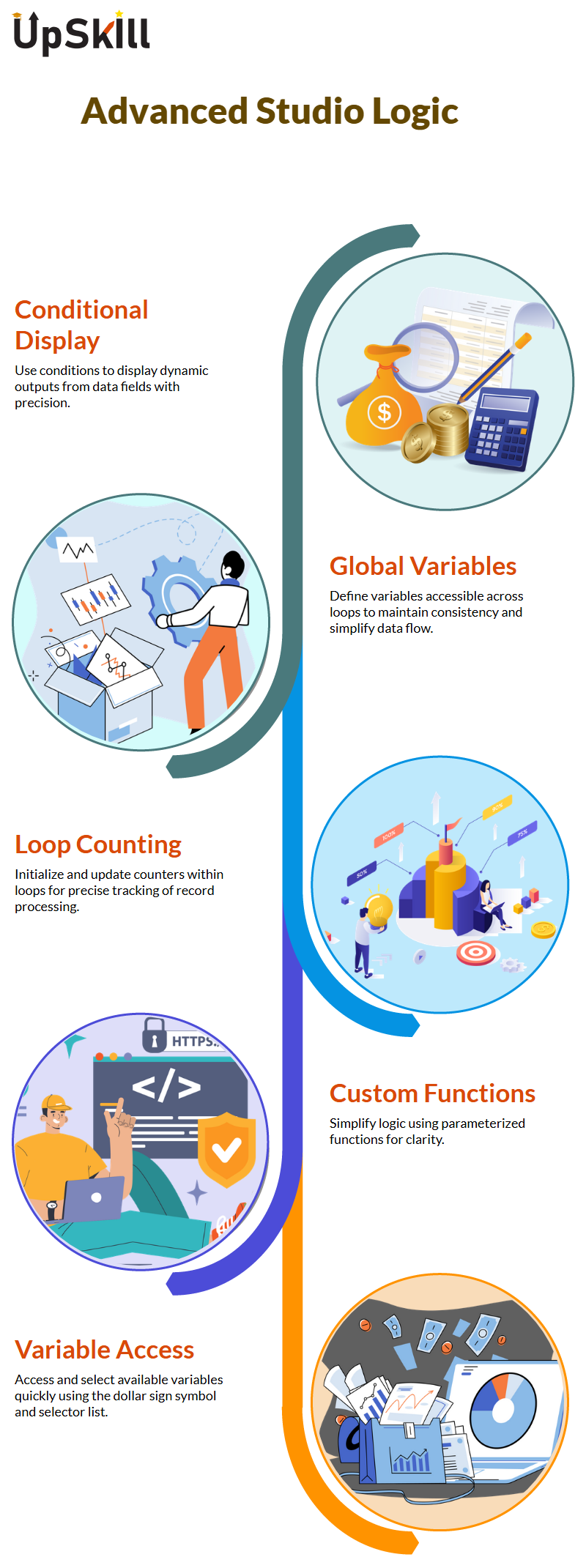
Custom Functions through Workday Advanced Studio
Custom functions enable developers to build reusable logic that enhances integrations easily.
When setting up custom functions in Workday Advanced Studio, defining them involves setting parameters, providing necessary values, and applying logic until the desired results are achieved, as explained in the Workday Advanced Studio training in Bengaluru.
Imagine we need to remove special characters from a string using custom functions. Then, we define a function with parameters that takes a string input, applies logic, and outputsSS the expected result. This approach ensures efficiency in Workday Advanced Studio.
ETV Transformations in Workday Advanced Studio
Element Transformation Validation (ETV) enables Workday Advanced Studio users to define validations, shorten strings, and enforce constraints by setting parameters such as required or maximum length values in ETV transformations.
ETV ensures data consistency and integrity by setting these requirements and restrictions in advance—a concept often covered in depth during Workday Advanced Studio training in Bengaluru.
Imagine we create an ETV rule that mandates a specific format for data. Workday Advanced Studio then enforces these rules, sending error messages whenever conditions are not fulfilled.
Additionally, Workday Advanced Studio features XCT functions for XML transformations, allowing developers to convert XML documents into text for smooth data integration.
A typical everyday use case involves converting XML data to CSV using Workday Advanced Studio’s XCT functions.
With well-defined logic, this transformation is handled efficiently, ensuring both accuracy and integrity skills typically sharpened through hands-on exercises in Workday Advanced Studio training in Bengaluru.
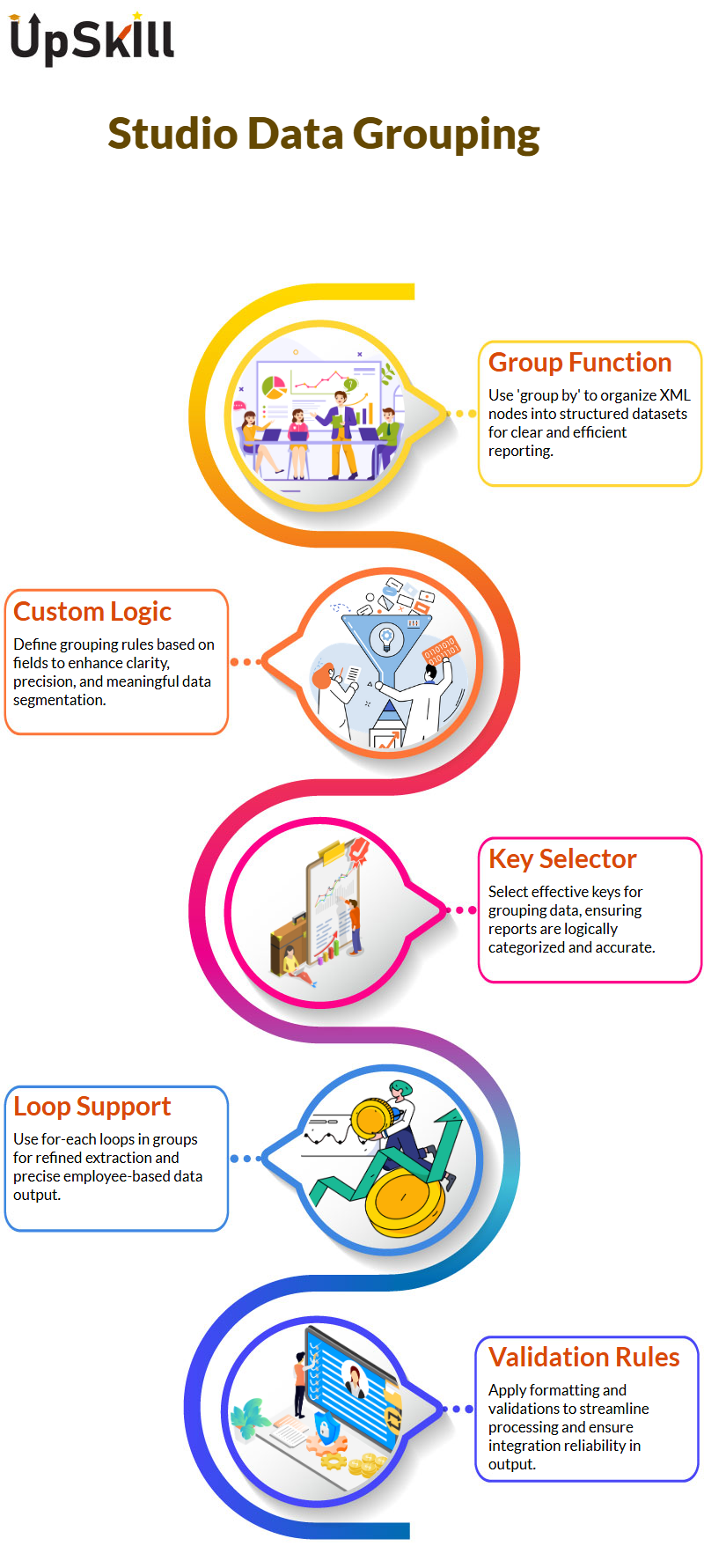
Grouping Workday Advanced Studio Data
Utilizing grouping functions within Workday Advanced Studio enables us to efficiently group related data sets together for structured output.
Utilising its “group by” feature, nodes within an XML document may be efficiently organised by using this technique.
Workday Advanced Studio empowers developers to define custom grouping logic, ensuring clarity and accuracy for specific fields.
Formatting and Validations through Workday Advanced Studio
Data formatting and validations play an integral part in Workday Advanced Studio, featuring built-in functions for formatting dates, numbers, and structured text while upholding strict validation regulations.
Workday Advanced Studio enhances data processing by utilising predefined formats and validation constraints, thereby increasing data processing speed while also improving integration reliability.
Welcome to Workday Advanced Studio’s Deep Dive! Are you curious to know how to efficiently group data for Workday reports?
Workday Advanced Studio features powerful XML processing capabilities that enable us to organise and manipulate data precisely a topic frequently explored in Workday Advanced Studio training in Bengaluru.
Today, we will demonstrate how to utilise Workday Advanced Studio’s “group by” function to structure XML data precisely the way you need, whether for employee certifications or multi-instance reports.
Whatever your data requirements, Workday Advanced Studio provides the tools to achieve your goals efficiently and accurately.
Applying Workday Advanced Studio Group
Let’s put Workday Advanced Studio through its paces! Assume we have multiple rows of data representing individual countries; by employing its “Group by” feature, we can easily categorise and manage this information efficiently.
The importance of selecting an effective key for grouping is highlighted by Workday Advanced Studio’s Grouping Key Selector, which plays a crucial role.
For example, by grouping by country, our XML parser consolidates data under each unique key for structured reporting—an essential practice when working with large datasets, often demonstrated during Workday Advanced Studio training in Bengaluru.
Workday Advanced Studio’s loop capabilities make data extraction even more precise; by applying a for-each loop within our XML groups, we can refine extraction with pinpoint accuracy. Its iterative grouping feature speeds up the extraction of employee information based on certification categories, ensuring the final output meets reporting needs exactly.
Why does “group by” matter in Workday Advanced Studio? Consider managing employee certifications—each employee may hold multiple certifications, and grouping them makes data retrieval much faster and more organised.
Workday Advanced Studio simplifies the retrieval and organisation of data by country, department, or certification type, whether generating reports or processing payroll.
This capability makes Workday Advanced Studio invaluable in data structuring—a fact well understood by those who undergo Workday Advanced Studio training in Bengaluru.
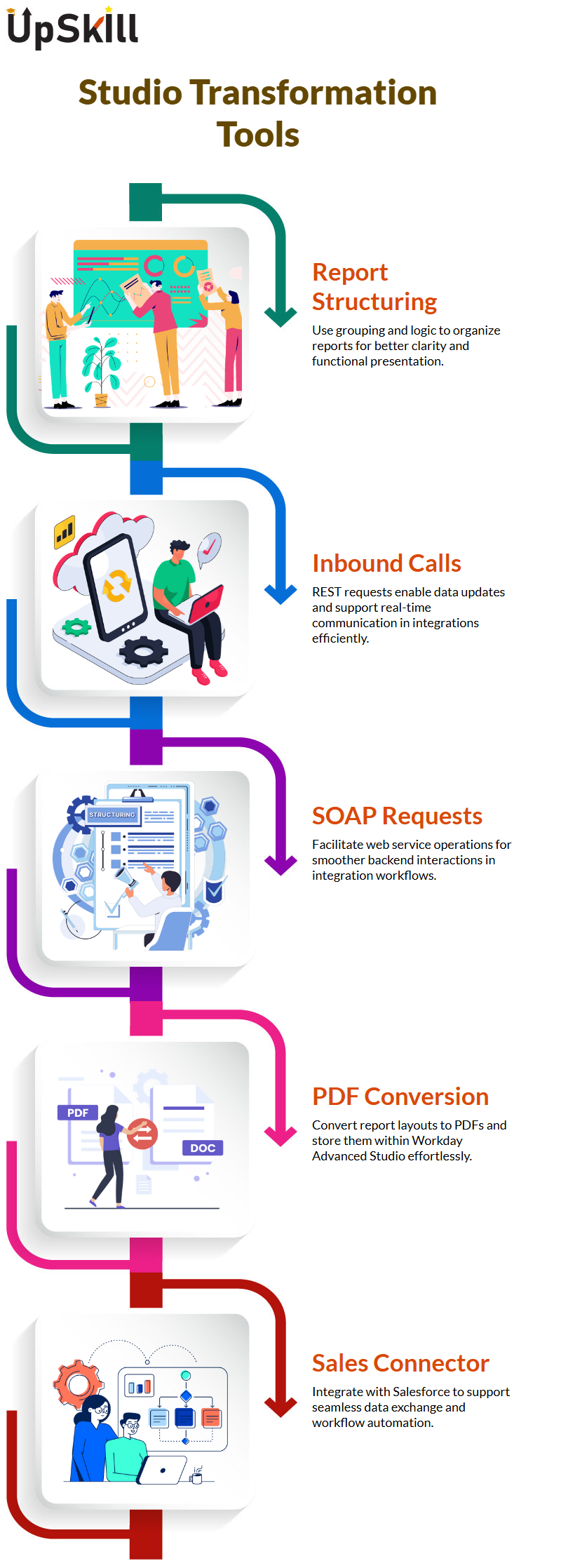
Exploring Data Transformation in Workday Advanced Studio
Workday Advanced Studio makes data transformation an indispensable feature, providing complete control over how reports appear through the use of grouping keys and conditional logic.
Workday Advanced Studio goes far beyond simple data extraction to produce visually meaningful reports that logically structure themselves using transformations to ensure each report serves its intended purpose effectively.
Welcome, all! Today, we explore Workday Advanced Studio as a powerful tool that facilitates integrations and dynamic workflows—ideal if you want to master Workday Advanced Studio!
If this sounds intriguing to you, then read on—there will be lots more of that later! Many of these concepts are covered in the Workday Advanced Studio training in Bengaluru.
Before we begin, let’s review yesterday’s session to identify any gaps or areas of confusion.
Don’t hesitate to seek clarification if necessary. Learning Workday Advanced Studio requires interaction and participation, so don’t be intimidated into silence by anyone’s silence.
Let’s begin by exploring one of Workday Advanced Studio’s key concepts—inbound and outbound calls.
REST calls enable users to make updates or submit reports, while SOAP requests facilitate the seamless operation of web services provided by Workday Advanced Studio.
Understanding these concepts will make navigating Workday Advanced Studio much more intuitive.
Key Components of Workday Advanced Studio
Workday Advanced Studio offers several components designed to simplify integration, including split and aggregate functionality that enhances data management efficiency.
Understanding these pieces correctly when using Workday Advanced Studio will be key—topics often emphasised in Workday Advanced Studio training in Bengaluru!
Standard components, such as event configuration retrieval, event document creation, and integration events, are key in Workday Advanced Studio, enabling the seamless location of necessary details.
Although some components may be rarely required in certain instances, their existence could save lives in specific circumstances.
Let’s discuss Workday Advanced Studio’s “Get Integration Event” tool, which allows us to retrieve integration details.
When working with complex business processes, understanding this feature will make your workflow more efficient.
Workday Advanced Studio comes packed with tools, such as the PDF Print Step, that make converting report layouts to PDF an effortless process.
Additionally, Workday Advanced Studio efficiently stores PDF documents within its system.
Workday Advanced Studio’s Sales Connector offers another exciting feature. When connecting to Salesforce, this connector ensures seamless data transfers. Understanding its workings will expand your integration capabilities.
Workday Advanced Studio’s workspace components provide visibility into ongoing integration projects, enabling project participants to track various elements and ensure a smooth workflow management easily.
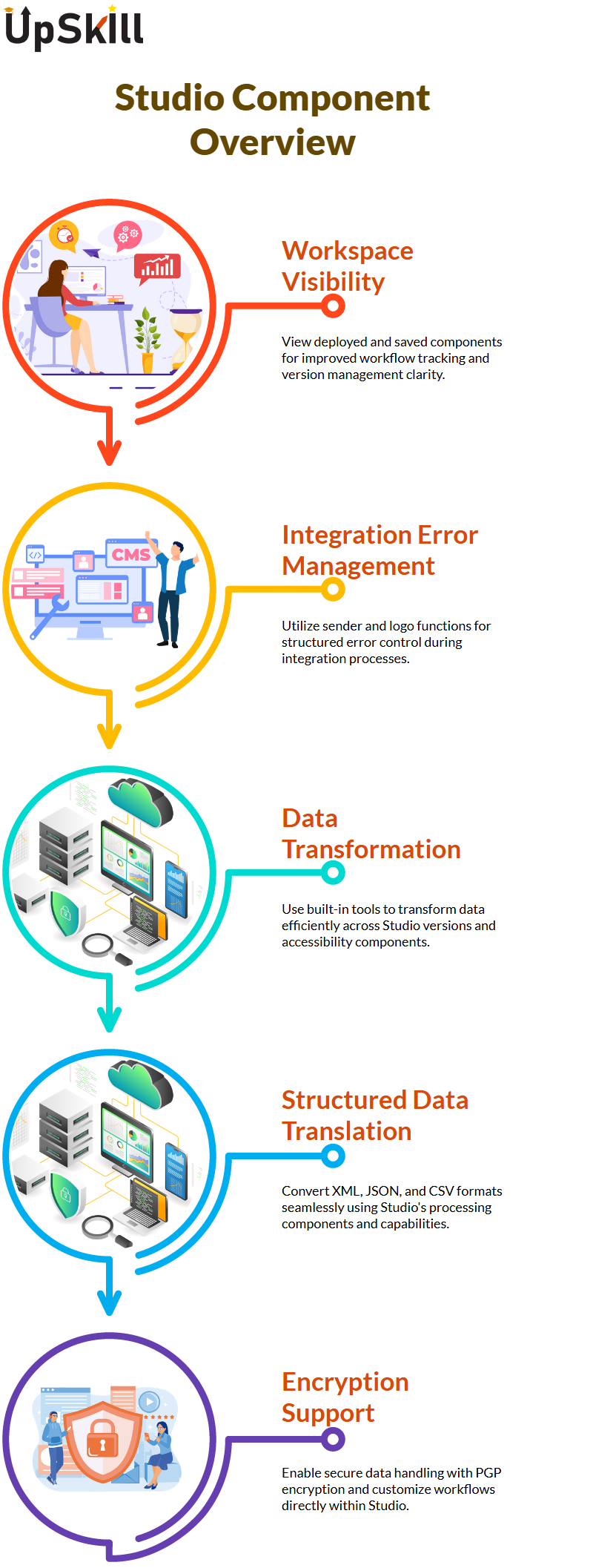
Workday Advanced Studio Components
Welcome back for another deep dive into Workday Advanced Studio. Today, we will examine its various components closely to understand their importance in building effective workflows.
Workday Advanced Studio’s workspace components enable you to view both deployed and saved items.
While these may seem unnecessary at first, they provide invaluable visibility into which components are managed within your workspace.
Error Handling in Workday Advanced Studio
Workday Advanced Studio incorporates error handling as a key feature to ensure seamless execution.
For error management, we primarily rely on the logo and sender functionality. As we discuss the concept of error handling, we’ll show how these elements fit together as part of the process.
Transformation in Workday Advanced Studio
Transforming is at the core of Workday Advanced Studio, featuring accessible components in multiple versions, such as 1.2, 2.2, and 3.2 versions; therefore, making the accessibility plus component the preferred choice among these options.
Working With XML and JSON in Workday Advanced Studio
Workday Advanced Studio offers seamless conversion between XML and JSON formats, whether that involves moving data from XML to JSON or vice versa. These components also ensure smooth conversion from CSV format, if applicable.
Workday Advanced Studio’s Copy feature facilitates effective message manipulation within processes, providing efficient handling and transformation capabilities that save time when managing workflow. This is one of the more useful capabilities when manipulating messages within them.
Encoding and Encryption in Workday Advanced Studio
Workday Advanced Studio features encryption tools such as PGP encryption/decryption; these are typically employed within business processes rather than directly within Studio itself.
Workday Advanced Studio provides unparalleled flexibility in business process customisation: instead of making modifications via backend deployments, Workday Advanced Studio’s flexibility in customising business processes offers exceptional options.
Many changes can now be implemented directly within each business process to streamline efficiency and simplify workflows—an approach often explored in Workday Advanced Studio training in Bengaluru.
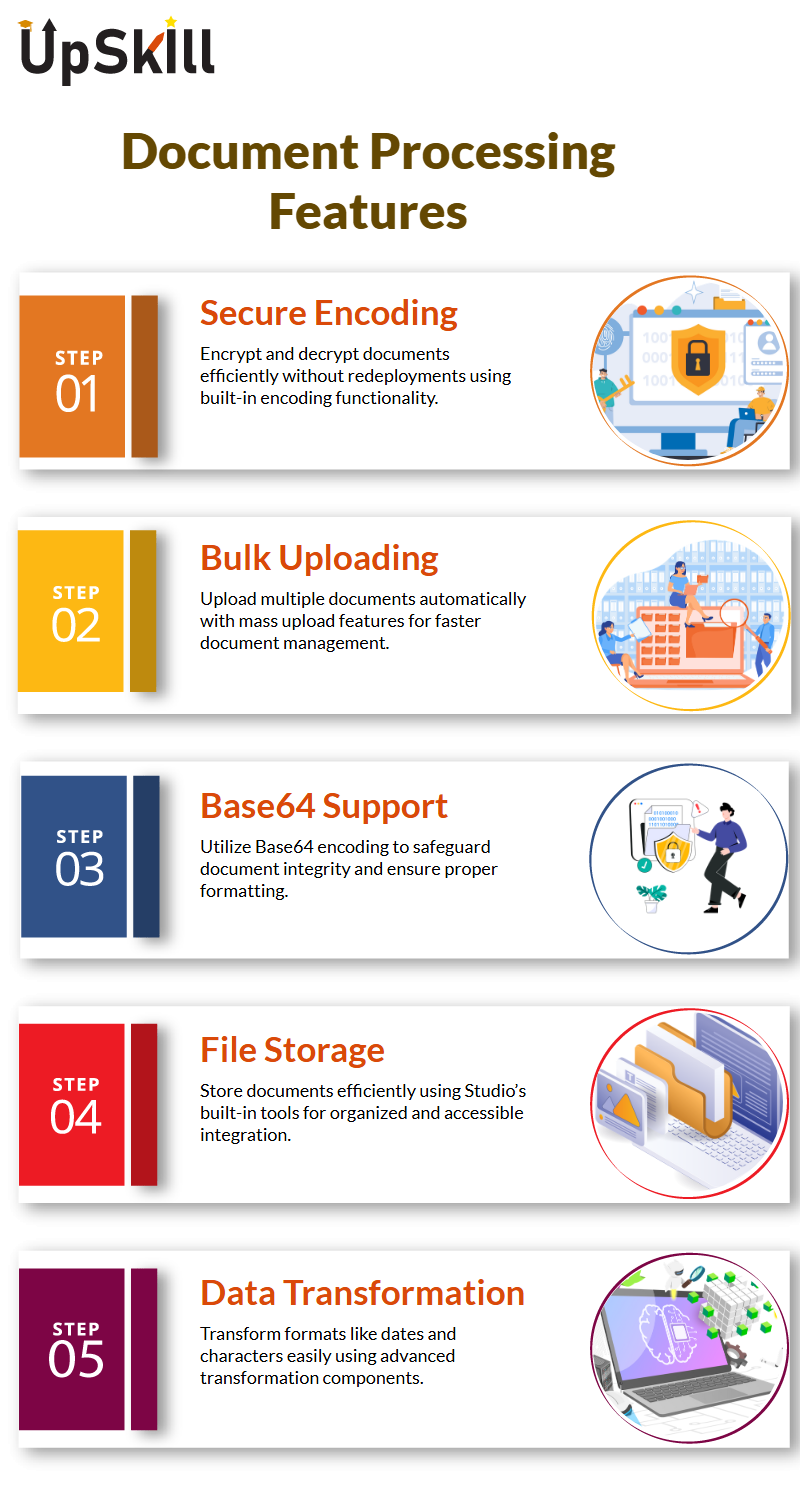
Encoding and Decoding Documents in Workday Advanced Studio
Encoding and decoding play a pivotal role when working with documents within Workday.
Therefore, Workday Advanced Studio offers efficient methods for data encryption and decryption, facilitating seamless modifications without requiring complicated redeployments.
Bulk Document Uploads in Workday Advanced Studio
Manually uploading multiple documents can be a time-consuming process. Workday Advanced Studio’s mass upload feature simplifies the task of document management by automating processes for large-scale document management projects.
With integrations and automation features like this in place, document uploads become automatic.
Encoding Methods in Workday Advanced Studio
For document processing, Workday Advanced Studio often relies on Base64 encoding systems as part of its document handling processes to protect both data security and proper formatting, making document handling much simpler overall.
Workday Advanced Studio’s File Storage Solutions: With Workday Advanced Studio comes an organised approach for document storage. Their Store Document function helps keep files accessible within their integration environment while streamlining operations.
Explore Data Transformation with Workday Advanced Studio
Data transformation is an indispensable function within Workday Advanced Studio, from formatting dates and characters to accessing components that enable the easier creation of custom transformation logic.
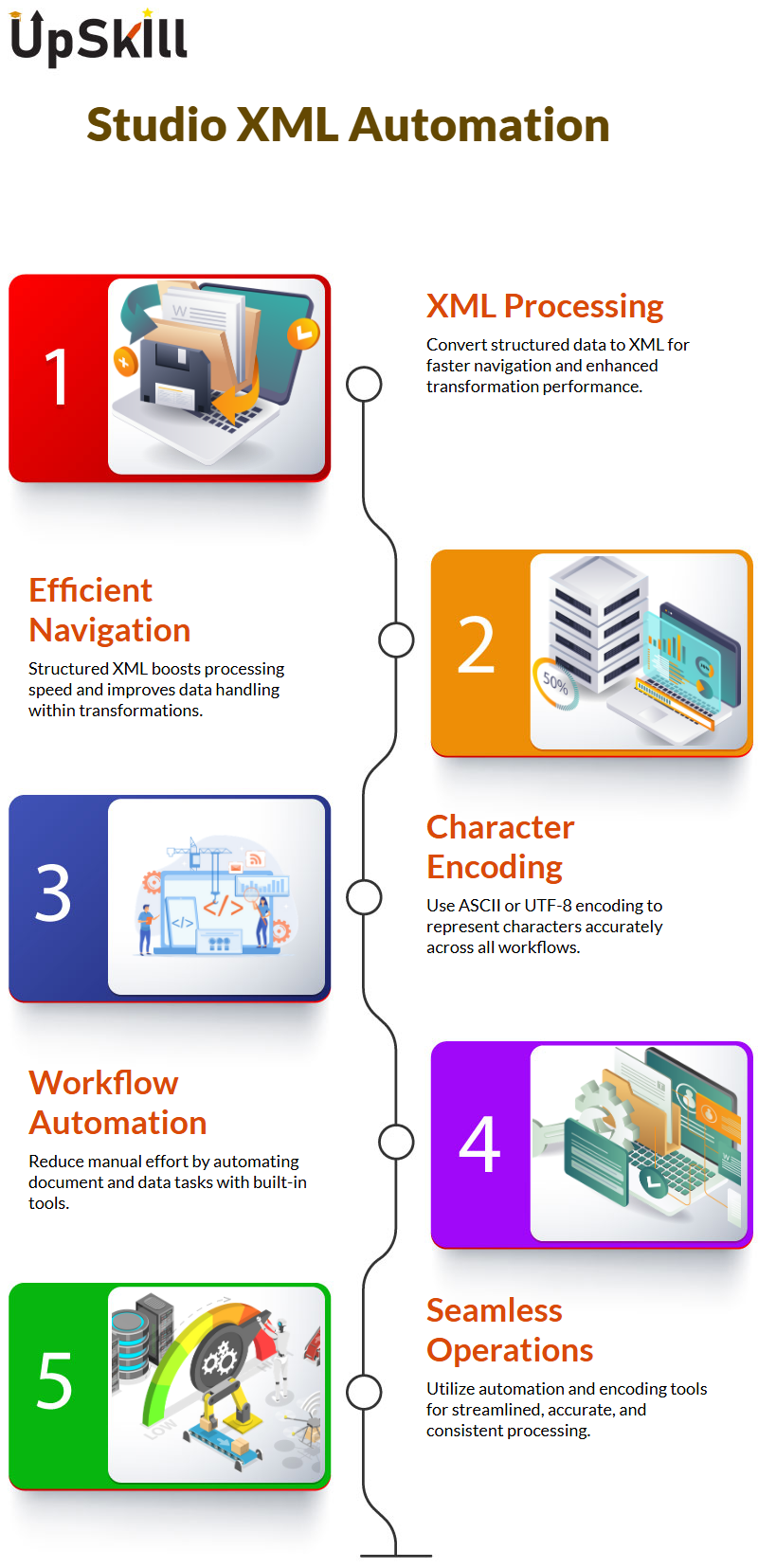
Workday Advanced Studio's XML Processing
XML is an integral component in managing structured data within Workday Advanced Studio, creating flexibility that increases navigation and transformation efficiency.
Converting structured data to an XML format enhances navigation speed and efficiency, leading to improved data transformation processes.
Character Encoding Techniques in Workday Advanced Studio
Workday Advanced Studio has made handling different character formats simple. Learning ASCII and UTF-8 conversions allows accurate representation across workflows.
Automation and Efficiency in Workday Advanced Studio
Workday Advanced Studio offers automation benefits by decreasing manual intervention in document and data management processes. By utilising its tools effectively, businesses can achieve seamless operations with ease.

